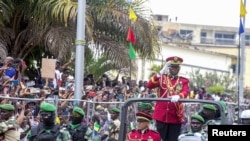September 30 marks exactly 30 days since Gabon's military seized power and ended the nearly 60-year rule of the Bongo family. But the military junta is dealing with daily protests from disgruntled trade unions, workers and students who are now demanding better living conditions in the oil-producing West African country.
Gabon's state TV on Friday reported people living with HIV or AIDS protesting at the Center for HIV/AIDS Treatment in the capital, Libreville, this week.
Alain Oyono, a spokesperson for the demonstrators, said patients are suffering from a drastic shortage of antiretroviral drugs and that people living with AIDS no longer receive regular funding from Gabon's government. Oyono also said people living with AIDS in Gabon want an end to the stigma and maltreatment they have been going through for several years, and that Gabon should pay attention to their plight because living with AIDS is not a death sentence.
Magistrates also protested this week, demanding an increase in pay.
Germain Nguema Ella, the president of the magistrates’ union, said military ruler General Brice Clotaire Oligui Nguema met with the striking magistrates this week.
Ella said that after an hour of negotiations, Nguema made commitments to improve the working conditions of magistrates within the shortest possible period of time, and Nguema asked them to exhibit patriotism by calling off the protest immediately.
Meanwhile, teachers, students, nurses and laboratory technicians, civil servants and hundreds of workers in Nkok, a special economic zone in Gabon, have also been protesting low pay and poor working conditions.
Several hundred youths this week stormed the presidential palace in Libreville asking to be recruited into the civil service. The military junta said in a statement that it is not planning to recruit for now.
Gabon's military junta says their first 30 days in power have not been easy, but that the protests indicate how disgruntled civilians were under the rule of ousted president Ali Bongo, who led Gabon for the past 14 years, and his father Omar, who ruled for over 40 years before his death in 2009.
Since seizing power on August 30, the military junta has tried to convince civilians, the international community, the opposition and rights groups that the coup saved Gabon from a civil war.
It says the opposition was ready to take arms after ousted president Bongo falsely declared himself winner of the August 26 presidential election.
Prime Minister Raymond Ndong Sima said local businesses are asking military leaders to pay an internal debt of about $5 billion.
Sima said he is “pleading with Gabon citizens to be of good faith and stop exerting unnecessary pressure on the government.” He said civilians have a right to express their needs, but the military junta has limited resources. He says the next 24 months will be very delicate as the government will intensify its drive to recover ill-gotten wealth and attend to Gabon's development needs.
The junta recently announced creation of a transitional constitutional council and the appointment of civilians to lead the nine provinces that make up Gabon. General Nguema also appointed a civilian as prime minister and new members of the National Assembly and Senate.
Gabon's military junta says it needs time to restore stability and ensure sustainable economic development. So far, it has not said how long the process will take.









